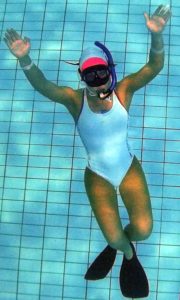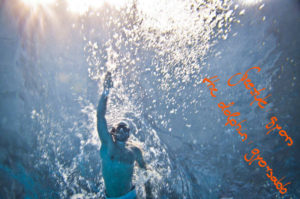You may find a great variety of the required ABC gear not only at diving shops but even at supermarkets and of course online, just a few clicks away. But not all fins, masks, and snorkels are fit to play UWR, to be honest, some sets are just hazardously trashy. The most expensive diving gear may also not be the best pick for rugby, but the best rugby kits won’t disappoint in the sea either.
Let’s see the lineup of diving products from a rugby player’s perspective! The rules call for bifins, so monofins are not allowed. The same goes for single-lens masks, and anything which may be considered dangerous, like a mask with pointy or sharp edges.
A good mask’s most important feature is that it fits your facial features well, meaning it shuts water out and feels comfortable over a longer time too. Larger lenses provide a larger field of view, but for a greater resistance in the water. We recommend changing the default silicone straps to heavy-duty ones that keep the mask on under heavy pressure.
The most common masks have their clones available under different names, these tend to differ in the strap buckle systems only. Technisub/Aqualung has a superior solution named cardanic joint.
So we highly recommend the Micromask or its big brother Impression. Players who’ve been playing for decades run Omer Abyss and Alien or Cressi Super Occhio too.
Sphera is also an interesting pick, the flexible plastic lenses grant a great view and the whole mask bends to your face so close, that no nasty punch can knock if off. There is a tradeoff, the curvature of the lenses distorts the view, and they also get stretched and foggy over time. Even new ones are prone to leakage and after a year or two, they tend to fall apart simply. You could settle with this as long as you got 3 Spheras for the price of 1 Micromask, but this is not the case anymore, so the Micromask is the better solution.
If price is important, it’s worth looking around online. But order a mask only if you’ve tried it… Even better, if you source your stuff from local diving shops. New masks tend to get foggy, wash them down first with a sponge and soap.
Choosing a snorkel is much less easy, the most simple ones are the best. There should be no pointy “wave-breaker” at the top, no collapsing flex-tube, and no valves either. Rookies should use long, uncut snorkels, which reach far above the surface. In your first fights you may bite down on the mouthpiece, so it’s convenient if these are sold separately and can be replaced. Decathlon deals the best offer here.
Some people can have cutting boards tied to their feet and will still be faster than you. No fins can replace swimming skills, but they can help you a lot to acquire them. Avoid cheap plastic fins, they won’t last till the end of your first session.
Fins are made of 3 types of materials:
a) plastic fins – fins designed for diving, with long blades. The Mares and the Stratos are both popular picks. You may use fin keepers to secure them on your feet.
b) rubber fins – the jolly jokers, perfect for rugby, swimming and diving alike. You can choose from 4 brand’s models, the ones we’d advocate for are the Hungarian Najade and Muréna for they are phenomenal tools in the water to play with.
c) composite blades – carbon and fiberglass are also valid, but pricey options. If you’re over 100 kilograms, quality composite fins made by WaterWay Fins or Leaderfins are worth considering. Manufacturers can already create very well-designed blades which grant you the right amount of flexibility and resistance for your weight and swimming style, but the needs of freediving define the fin’s market, we are yet to see fins engineered for rapid turns.
The length of the fins should match your swimming style. In theory, longer fins grant you higher speed, but that’s not always true. However, shorter fins always have an advantage in turning.
This is The Current’s recommendation for gear, the kind that allows you to focus on the game and bring the most out of yourself. Most players like their rugby set so much, that it’s also their freediving gear. Another practical advantage: short rugby fins give you no headache during flights, you can even bring them on board if you’re lacking suitcase space.


























